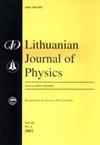宽温度范围内掺杂硅的产生复合噪声及其他特性
IF 0.3
4区 物理与天体物理
Q4 PHYSICS, MULTIDISCIPLINARY
引用次数: 0
摘要
在25至360 K的温度范围内研究了硅中产生-复合(g-r)过程的特性。在浅施主的情况下,研究表明自由电子密度强烈依赖于温度:在液氮温度下,只有20%的施主在约1017 cm–3的浅施主密度下被电离。对于具有浅施主的硅样品,由于自由电子密度波动引起的生成复合噪声的最大方差随着施主密度而强烈增加,并且随着温度而偏移。结果表明,在低温下,自由电子数波动的相对方差总是等于0.5。归一化的生成复合噪声谱被描述在非常宽的频率范围内。还详细研究了具有两个施主能级的受主部分补偿硅样品的产生-复合噪声特性。在这项工作中,主要关注浅施主掺杂硅的特性,因为它被广泛使用。本文章由计算机程序翻译,如有差异,请以英文原文为准。
Generation-recombination noise and other features of doped silicon in a wide temperature range
The characteristics of the generation-recombination (g-r) process in silicon are investigated in a temperature range from 25 to 360 K. In the case of shallow donors, it is shown that the free electron density strongly depends on temperature: only 20% of donors are ionized at shallow donor densities of about 1017 cm–3 at liquid nitrogen temperature. The maximum of the variance of generation-recombination noise due to the free electron density fluctuations for a silicon sample with shallow donors strongly increases with donor density and shifts with temperature. It is demonstrated that the relative variance of free electron number fluctuations is always equal to 0.5 at low temperatures. The normalized generation-recombination noise spectra are depicted in a very wide frequency range. There is also a detailed investigation of the generation-recombination noise characteristics of an acceptor-partially compensated silicon sample with two donor levels. In this work, the main focus is on the characteristics of silicon doped by shallow donors as it is extremely widely used.
求助全文
通过发布文献求助,成功后即可免费获取论文全文。
去求助
来源期刊

Lithuanian Journal of Physics
物理-物理:综合
CiteScore
0.90
自引率
16.70%
发文量
21
审稿时长
>12 weeks
期刊介绍:
The main aim of the Lithuanian Journal of Physics is to reflect the most recent advances in various fields of theoretical, experimental, and applied physics, including: mathematical and computational physics; subatomic physics; atoms and molecules; chemical physics; electrodynamics and wave processes; nonlinear and coherent optics; spectroscopy.
 求助内容:
求助内容: 应助结果提醒方式:
应助结果提醒方式:


